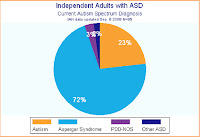Definition and origin of the term
Asperger's syndrome (AS), or Asperger syndrome, or Asperger disorder, or simply Aspergers (/ˈɑspərɡərz/ or /ˈæspərɡərz/) is an autism spectrum disorder (ASD). Aspergers in adults and children is characterized by difficulties in communication and social interaction as well as restricted and repetitive behavior patterns and interests.
Asperger's Syndrome (named after the Austrian pediatrician Hans Asperger) was first identified in the 1940s, but became widely understood and diagnosed in the English-speaking world not long time ago. It is now estimated that one in 100-200 people, most of them male, may suffer from either autism or Asperger's Syndrome.
Asperger's Syndrome in adults
 |
| From iancommunity.org |
 |
| From iancommunity.org |
Working with autism spectrum disorders
The hardest period for teenagers with Aspergers Syndrome is the period of early adulthood, especially entering the world of university or work. While many people with ASD may have high IQs and be technically and logically extremely proficient, Aspergers in adults does result in inability to relate to other people. In some careers, this may not matter. But in other professions, the syndrome can be a massive problem. As a suggestion, careers that rely on short memory should be avoided, e.g.: cashier, waitress, taxi dispatcher, air traffic controller, receptionist etc.
Please use the included resources to find more information about Aspergers in adults and Asperger's Syndrome screening, testing, diagnosis, therapies, prognosis etc.